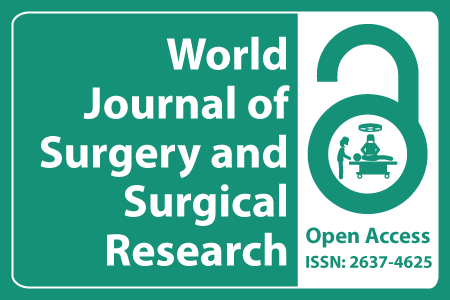
Journal Basic Info
- Impact Factor: 1.989**
- H-Index: 6
- ISSN: 2637-4625
- DOI: 10.25107/2637-4625
Major Scope
- Ophthalmology
- Laparoscopic Surgery
- Neurological Surgery
- General Surgery
- Obstetrics & Gynecology
- Plastic Surgery
- Hand Surgery
- Otolaryngology & ENT Surgery
Abstract
Citation: World J Surg Surg Res. 2021;4(1):1327.DOI: 10.25107/2637-4625.1327
Association between the Use of Proton Pump Inhibitors with the Risk and the Prognosis of Breast Cancer: A Systematical Review
Jingtao Hu1#, Wenjie Hu2#, Chenyu Sun3, Ce Cheng4, Qin Zhou5 and Lei Yue6*
1Aviation Hygiene Branch, Anhui Branch, China Eastern Airlines Co., Ltd, Xinqiao avenue, Anhui, China
2Department of Neurology, The First Affiliated Hospital of Anhui Medical University, China
3AMITA Health Saint Joseph Hospital Chicago, USA
4The University of Arizona College of Medicine at South Campus, USA
5Mayo Clinic, Rochester, USA
6Nanjing Center for Disease Control and Prevention, China
#These authors contributed equally to this work
PDF Full Text Research Article | Open Access
Abstract:
Purpose: To evaluate the association between the uses of Proton Pump Inhibitors (PPIs) and the
risk of Breast Cancer (BC) before patients having a BC diagnose and explore the prognosis of using
PPIs after patients diagnosed with BC.
Methods: Candidate publications were identified in the online databases up to February 20th,
2020. Literature selection and data extraction were carried out according to preset criterion by two
independent reviewers. Using the pooled Odds Ratios (ORs) and their 95% Confidence Intervals
(CIs) to calculate the relationship between PPIs use and BC risk with a random-effect model in Stata
14.0. The dose-response relationship between the two was further explored. While the prognosis of
BC patients using PPIs was described qualitatively.
Results: Six studies met in our inclusion criteria including 172,063 participants in which 70,070
were BC patients. The overall result of one cohort study and two case-control studies suggested
an inverse correlation between PPIs use and BC risk. The pooled OR was 0.70 (95% CI: 0.50-
0.97) with high heterogeneity (I2= 95.1%, P=0.000). Dose-response analysis did not find a doseresponse
relationship. Two retrospective cohort studies showed survival benefit from using PPIs
in BC patients was not significant. While one Randomized Controlled Trial (RCT) revealed that
intermittent high-dose of PPIs use could improve the survival benefit of Metastatic Breast Cancer
(MBC) patients.
Conclusion: Our findings suggested that women ever used PPIs had a decreased risk of BC but the
dose-response relationship could not be found. While the prognosis of BC patients using PPIs still
remained controversial.
Keywords:
Proton Pump Inhibitors; PPIs; Breast Cancer; Meta-analysis
Cite the Article:
Hu J, Hu W, Sun C, Cheng C, Zhou Q, Yue L. Association between the Use of Proton Pump Inhibitors with the Risk and the Prognosis of Breast Cancer: A Systematical Review. World J Surg Surgical Res. 2021; 4: 1327..













